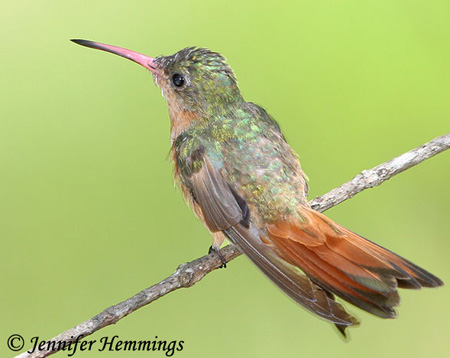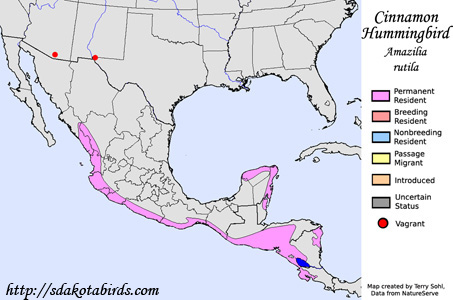| Length: 4 inches | Wingspan: 5.5 inches | Seasonality: Non-resident in South Dakota |
| ID Keys: Underparts are completely (and uniquely) cinnamon in tone, rufous tail, upperparts bronzy-green | ||
 The
Cinnamon Hummingbird is primarily a bird of Mexico and Central America.
It was unknown in the United States until July of 1992, when a bird was
found in southern Arizona. The next year, in September of 1993,
another individual was found near the Texas/New Mexico border, just across
from the Rio Grande. While other Amazilia hummingbirds can be found
visiting the United States, the Cinnamon Hummingbird is unique throughout
its range as the only hummingbird with completely cinnamon underparts.
The
Cinnamon Hummingbird is primarily a bird of Mexico and Central America.
It was unknown in the United States until July of 1992, when a bird was
found in southern Arizona. The next year, in September of 1993,
another individual was found near the Texas/New Mexico border, just across
from the Rio Grande. While other Amazilia hummingbirds can be found
visiting the United States, the Cinnamon Hummingbird is unique throughout
its range as the only hummingbird with completely cinnamon underparts.
Habitat: Cinnamon Hummingbirds are typically found in semi-open country and around woodland and forest edges, most often around deciduous or semi-deciduous forests. They can also be found in habitats which have been rather extensively modified by man, such as plantation lands and grassy or brushy agricultural areas.
Diet: Typical diet of Hummingbirds, feeding heavily on nectar. Insects can comprise a large portion of the diet.
Behavior: Bold and aggressive in defending nesting and feeding territories, often chasing away larger hummingbirds and other birds. .
Nesting: The nest is built of bits of plant material with spider webs to hold material together. Lichens often adorn the outside of the nest, similar to other hummingbird nests. Breeding can occur at any time of the year, depending on specific location and vegetation conditions. Females alone incubate eggs and raise the young.
Song: Song of the Cinnamon Hummingbird is a series of clear, repeated notes...chi-chi-chi-chi.
Migration: Most birds are non-migratory, other than altitudinal shifts in population after the summer breeding season. Altitudinal shifts are typically in response to shortages in preferred food supplies, with moves to higher elevation.
Interactive eBird Map: Click for access to an interactive eBird map of Cinnamon Hummingbird sightings
Feeders: Will attend hummingbird feeders
Similar Species: Buff-bellied Hummingbird
Conservation Status: There are currently no perceived major threats to Cinnamon Hummingbird populations, and Birdlife International cites it as a species of "Least Concern".
Further Information: 1) Cornell's Neotropical Birds - Cinnamon Hummingbird
2) West Texas Hummingbirds - Cinnamon Hummingbird
3) WhatBird - Cinnamon Hummingbird
Photo Information: April 2010 - Jennifer Hemmings
Additional Photos: Additional Photos Coming Soon!!
| Click below for a higher-resolution map |
 |
| South Dakota Status: Non-resident in South Dakota |
Additional Buff-bellied Hummingbird Photos (coming soon!!)
